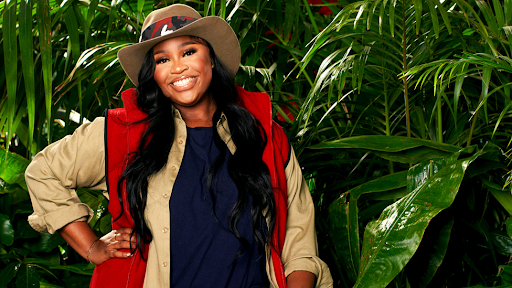Britain, are you not ashamed of yourself? Are you not embarrazzed?

By Tumininu Peters, BA Politics and International Relations
In an unexpected twist for the 2023 season of ‘I’m a Celeb’, the public’s designated villain was not the divisive politician Nigel Farage but the YouTuber, Nella Rose. Known to Gen-Z for her humorous videos and sharp retorts, Rose was subjected to a torrent of social media abuse, revealing Britain’s latent prejudices, and most of the public’s failure to critically evaluate the role of selective editing when consuming faux-reality television.
Rose was heavily taunted for setting boundaries in the intense jungle environment, a measure intended to protect her mental and emotional health. This raises the question: would other contestants have faced comparable criticism if they had done the same? The likely answer reveals a double standard rooted in unconscious biases. Her experience highlights the challenges Black women face in the public eye. It is not just about setting boundaries, it is about doing so without fear of backlash. Some might argue that setting boundaries in a show like ‘I’m a Celeb’, which is inherently about pushing limits, could be seen as going against the spirit of the contest. This perspective fails to consider the importance of mental health, especially in competitive televised environments.
“The spark of misogynoir was lit, and social media was all too eager to fan the flames.”
We must bear in mind that just as a Rose cannot exist without thorns, it is unrealistic to expect Nella to be entirely flawless and free from misunderstandings, as imperfection is an inherent part of our shared human experience. Despite her reconciliation with Fred Sirieux, the damage was already inflicted. The spark of misogynoir was lit, and social media was all too eager to fan the flames. One user on X even remarked, “I lost my dad less than 18 months ago, but I wouldn’t react like that. What an absolute psycho.” This comment overlooks numerous studies concluding that there is no normal way to grieve. Yet, viewers seemed to disregard the fact that everyone’s grieving process is unique.
It cannot be ignored that the media also played a role in fuelling the controversy. Newspaper headlines sensationalised her comments about Nigel Farage’s anti-immigrant stance. The streets became a verbal poll of her grief-stricken reaction, sparking a heated national debate – a mere tactic designed to create news. The media’s portrayal of Nella Rose raises questions about the ethics of reality television editing. ‘I’m a Celeb’ is a show designed for entertainment. The producers have the power to manipulate footage to create narratives that may not reflect the reality of the contestants’ experiences. In Nella Rose’s case, it is worth questioning whether her portrayal was correct, or a product of selective editing. Still, it is also important to consider the role of the audience in interpreting these narratives. As viewers, we have a responsibility to critically evaluate the content we consume and to question the narratives presented to us.
The public reaction Nella faced only exposes an uncomfortable truth: racism is still very much alive in our society. The fact that she was paid the least out of all the contestants is a stark reminder of the racial disparities that persist even in the world of entertainment. For instance, Nella Rose was paid £40,000, while Nigel Farage, a controversial figure, was paid a staggering £1.5 million. This pay disparity is not just ‘unfair’, it is a reflection of the systemic racism that continues to rot our society.
It is crucial to acknowledge the severity of the criticism she has faced. On numerous occasions, she has been derogatorily referred to as a “UK beast” on the social media platform TikTok. This term, steeped in misogynoir, is a stark example of the disproportionate backlash she has received. The question arises: how can a minor misunderstanding lead to such a harsh label? This incident is not unique but indicative of a broader pattern of how Black women are treated in the media. They are often denied the empathy and understanding extended to their white counterparts.
As we reflect on the treatment of Nella Rose, we must confront the racism that fuelled it. Only then can we hope to develop a society where Black women can finally be publicly perceived without intense media bullying. It is high time we asked ourselves, Britain, are you not embarrazzed? You’re right, Nella; this truly is embarrazzing.




